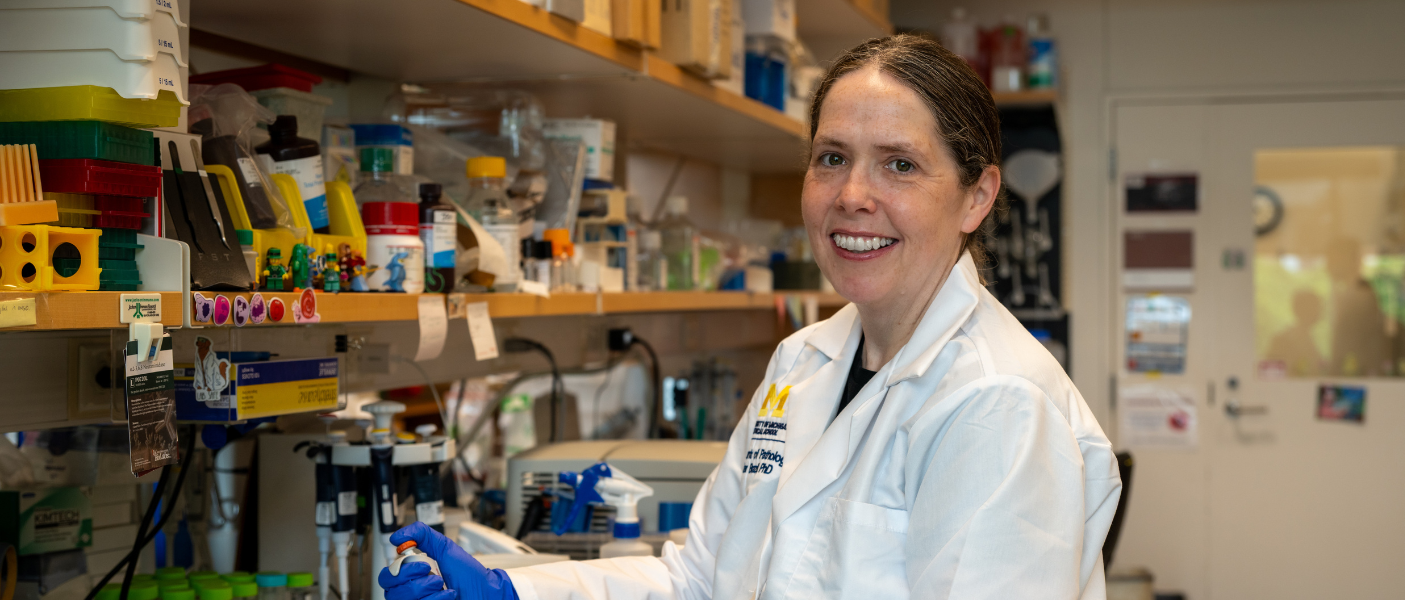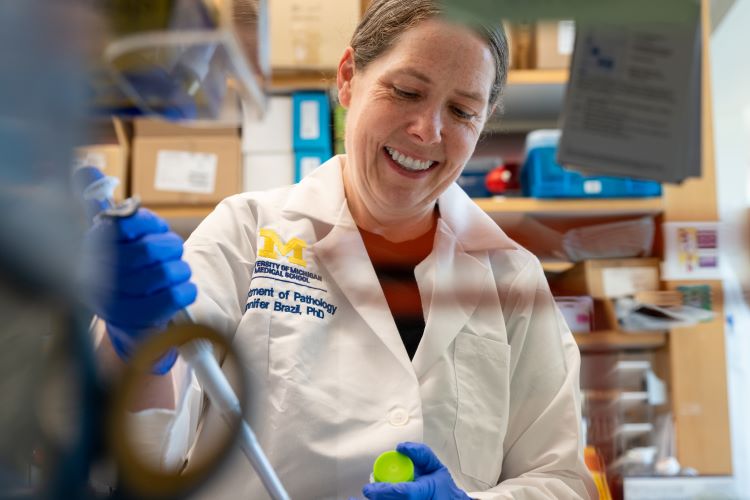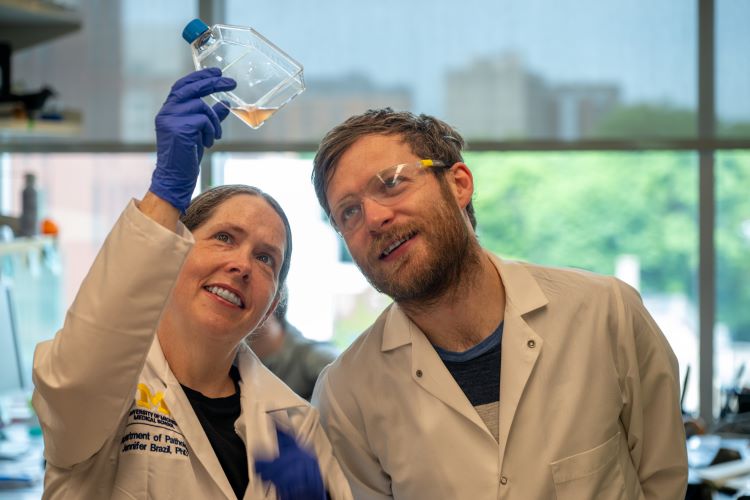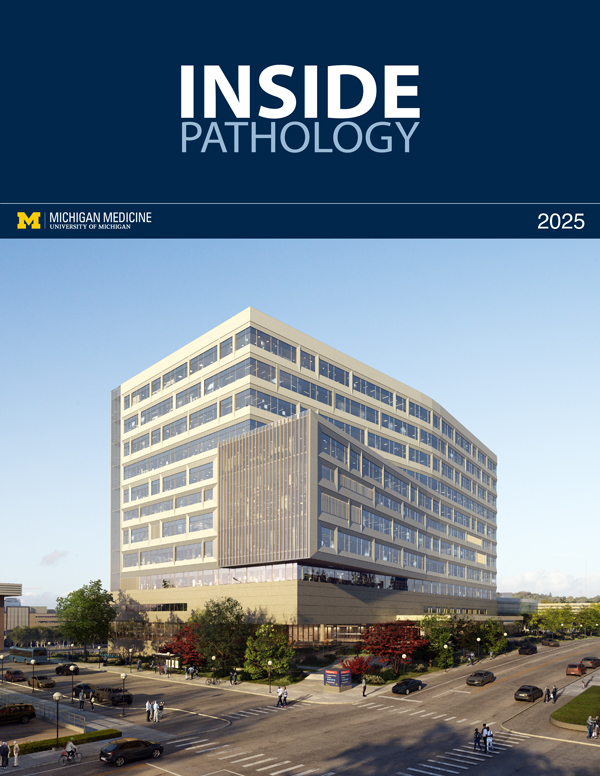

 Dublin, Ireland is home to the beautiful St. Patrick’s Cathedral, the imposing Dublin Castle, and the famous Guinness Storehouse. However, the city also produced another noteworthy member, Pathology’s Jennifer Brazil, PhD. Brazil was born and raised in Dublin, attending the University College Dublin (UCD) where she graduated with a bachelor’s degree in microbiology. During this time, she caught the bug for research, benefiting from multiple lab placements where she learned exciting techniques important for bacteriology, virology, and microbial genetics. After graduation, she spent a year backpacking in Australia with classmates, where she particularly enjoyed hiking in the Australian outback, working in an ecolodge in the Daintree rainforest, and snorkeling in the Great Barrier Reef.
Dublin, Ireland is home to the beautiful St. Patrick’s Cathedral, the imposing Dublin Castle, and the famous Guinness Storehouse. However, the city also produced another noteworthy member, Pathology’s Jennifer Brazil, PhD. Brazil was born and raised in Dublin, attending the University College Dublin (UCD) where she graduated with a bachelor’s degree in microbiology. During this time, she caught the bug for research, benefiting from multiple lab placements where she learned exciting techniques important for bacteriology, virology, and microbial genetics. After graduation, she spent a year backpacking in Australia with classmates, where she particularly enjoyed hiking in the Australian outback, working in an ecolodge in the Daintree rainforest, and snorkeling in the Great Barrier Reef.
When her year in Australia ended, she returned to Dublin, pursuing a master’s degree in molecular medicine at Trinity College. Upon completion, she embarked on a PhD in immunology at the University College Dublin School of Medicine and Medical Science, working in the lab of Dr. Clare O’Connor. She focused her studies on the role neutrophils play in the pathogenesis of Chronic Obstructive Pulmonary Disease (COPD) and Asthma. In September 2008, Brazil relocated to Emory University, Atlanta, GA, to work with Dr. Nancy Louis. During her postdoctoral studies, she studied neutrophil glycosylation and function during intestinal inflammation. She investigated the role of CD44 in regulating the detachment of migrating neutrophils across the intestinal epithelium. She then examined how alpha 3/4 Fucosyltransferase 3-dependent synthesis of Sialyl Lewis A on a CD44 variant containing exon 6 mediates polymorphonuclear leukocyte detachment from the intestinal epithelium while these leukocytes are crossing the intestinal epithelium during inflammatory bowel disease. This research was published in the Journal of Immunology (2010 and 2013). Brazil completed her postdoctoral research in 2013 and was appointed Research Associate at Emory University.
 While at Emory University, Brazil met Dr. Charles Parkos and Dr. Asma Nusrat. When Parkos accepted the position of Chair of Pathology at U-M in 2014, he recruited Brazil to join him at Michigan. Brazil joined the faculty at Michigan in December 2014 as a Research Investigator and continued to work with Parkos and Nusrat in their research laboratory. In 2018, she was promoted to Assistant Professor and began her own research laboratory. She continued to research the mechanisms by which polymorphonuclear neutrophils (PMN) and epithelial glycans can be targeted to alter neutrophil transepithelial migration and neutrophil function under conditions of intestinal inflammation and repair.
While at Emory University, Brazil met Dr. Charles Parkos and Dr. Asma Nusrat. When Parkos accepted the position of Chair of Pathology at U-M in 2014, he recruited Brazil to join him at Michigan. Brazil joined the faculty at Michigan in December 2014 as a Research Investigator and continued to work with Parkos and Nusrat in their research laboratory. In 2018, she was promoted to Assistant Professor and began her own research laboratory. She continued to research the mechanisms by which polymorphonuclear neutrophils (PMN) and epithelial glycans can be targeted to alter neutrophil transepithelial migration and neutrophil function under conditions of intestinal inflammation and repair.
“My work has defined key differences in the glycans expressed on normal versus inflamed intestinal epithelium, identifying sialyl Lewis A (sLea) as an inflammation-induced glycan that marks inflamed intestinal mucosa in individuals with inflammatory bowel disease (IBD). Further, our research shows that targeting sLea on the epithelial protein CD44v6 blocks PMN transepithelial migration, the first report of glycan-mediated regulation of neutrophil transepithelial migration.” This novel finding was published in the Journal of Immunology. Other work has identified novel glycan determinants expressed on neutrophils, including Lewis A (Lea), and the critical functional consequences of glycan targeting on neutrophil transepithelial migration and inflammatory function. Brazil commented on the importance of this discovery, “Differences in outcomes downstream of targeting highly related glycans, including Lea and Lewis X (Lex), highlight the exquisite sensitivity and specificity of glycan-mediated functional effects.” Her most recent studies (published in Journal of Clinical Investigation Insight) have shown that sialylated glycans can be targeted to reduce excessive neutrophil influx, which protects against experimental colitis and improves wound repair in the colon. “This highlights the clinical utility of glycan-based therapeutics for mucosal diseases, including inflammatory bowel disease,” she added. Brazil’s current research (funded by the Crohn’s and Colitis Foundation and an NIH R56 award) focuses on determining how glycosylation of the protein tyrosine phosphatase CD45 regulates neutrophil function in health and disease.
 Over the next few years, Brazil plans to continue her exciting and innovative research and publish her results in peer-reviewed high-impact journals. She will also write grant applications to the NIH and private funding agencies to support her research efforts. “I hope to have the opportunity to present my work at meetings and continue learning new techniques and technologies to further my research in the vibrant and exciting environment here at the University of Michigan.”
Over the next few years, Brazil plans to continue her exciting and innovative research and publish her results in peer-reviewed high-impact journals. She will also write grant applications to the NIH and private funding agencies to support her research efforts. “I hope to have the opportunity to present my work at meetings and continue learning new techniques and technologies to further my research in the vibrant and exciting environment here at the University of Michigan.”
Outside the laboratory, Brazil loves to travel. “Even though I have lived on three different continents, I have a long list of places I am excited to travel to in the future.” She also enjoys reading, board games, hiking, and spending time with friends and family.
 ON THE COVER
ON THE COVER
Breast team reviewing a patient's slide. (From left to right) Ghassan Allo, Fellow; Laura Walters, Clinical Lecturer; Celina Kleer, Professor. See Article 2014Department Chair |

newsletter
INSIDE PATHOLOGYAbout Our NewsletterInside Pathology is an newsletter published by the Chairman's Office to bring news and updates from inside the department's research and to become familiar with those leading it. It is our hope that those who read it will enjoy hearing about those new and familiar, and perhaps help in furthering our research. CONTENTS
|
 ON THE COVER
ON THE COVER
Autopsy Technician draws blood while working in the Wayne County morgue. See Article 2016Department Chair |

newsletter
INSIDE PATHOLOGYAbout Our NewsletterInside Pathology is an newsletter published by the Chairman's Office to bring news and updates from inside the department's research and to become familiar with those leading it. It is our hope that those who read it will enjoy hearing about those new and familiar, and perhaps help in furthering our research. CONTENTS
|
 ON THE COVER
ON THE COVER
Dr. Sriram Venneti, MD, PhD and Postdoctoral Fellow, Chan Chung, PhD investigate pediatric brain cancer. See Article 2017Department Chair |

newsletter
INSIDE PATHOLOGYAbout Our NewsletterInside Pathology is an newsletter published by the Chairman's Office to bring news and updates from inside the department's research and to become familiar with those leading it. It is our hope that those who read it will enjoy hearing about those new and familiar, and perhaps help in furthering our research. CONTENTS
|
 ON THE COVER
ON THE COVER
Director of the Neuropathology Fellowship, Dr. Sandra Camelo-Piragua serves on the Patient and Family Advisory Council. 2018Department Chair |

newsletter
INSIDE PATHOLOGYAbout Our NewsletterInside Pathology is an newsletter published by the Chairman's Office to bring news and updates from inside the department's research and to become familiar with those leading it. It is our hope that those who read it will enjoy hearing about those new and familiar, and perhaps help in furthering our research. CONTENTS
|
 ON THE COVER
ON THE COVER
Residents Ashley Bradt (left) and William Perry work at a multi-headed scope in our new facility. 2019Department Chair |

newsletter
INSIDE PATHOLOGYAbout Our NewsletterInside Pathology is an newsletter published by the Chairman's Office to bring news and updates from inside the department's research and to become familiar with those leading it. It is our hope that those who read it will enjoy hearing about those new and familiar, and perhaps help in furthering our research. CONTENTS
|
 ON THE COVER
ON THE COVER
Dr. Kristine Konopka (right) instructing residents while using a multi-headed microscope. 2020Department Chair |

newsletter
INSIDE PATHOLOGYAbout Our NewsletterInside Pathology is an newsletter published by the Chairman's Office to bring news and updates from inside the department's research and to become familiar with those leading it. It is our hope that those who read it will enjoy hearing about those new and familiar, and perhaps help in furthering our research. CONTENTS
|
 ON THE COVER
ON THE COVER
Patient specimens poised for COVID-19 PCR testing. 2021Department Chair |

newsletter
INSIDE PATHOLOGYAbout Our NewsletterInside Pathology is an newsletter published by the Chairman's Office to bring news and updates from inside the department's research and to become familiar with those leading it. It is our hope that those who read it will enjoy hearing about those new and familiar, and perhaps help in furthering our research. CONTENTS
|
 ON THE COVER
ON THE COVER
Dr. Pantanowitz demonstrates using machine learning in analyzing slides. 2022Department Chair |

newsletter
INSIDE PATHOLOGYAbout Our NewsletterInside Pathology is an newsletter published by the Chairman's Office to bring news and updates from inside the department's research and to become familiar with those leading it. It is our hope that those who read it will enjoy hearing about those new and familiar, and perhaps help in furthering our research. CONTENTS
|
 ON THE COVER
ON THE COVER
(Left to Right) Drs. Angela Wu, Laura Lamps, and Maria Westerhoff. 2023Department Chair |

newsletter
INSIDE PATHOLOGYAbout Our NewsletterInside Pathology is an newsletter published by the Chairman's Office to bring news and updates from inside the department's research and to become familiar with those leading it. It is our hope that those who read it will enjoy hearing about those new and familiar, and perhaps help in furthering our research. CONTENTS
|
 ON THE COVER
ON THE COVER
Illustration representing the various machines and processing used within our labs. 2024Department Chair |

newsletter
INSIDE PATHOLOGYAbout Our NewsletterInside Pathology is an newsletter published by the Chairman's Office to bring news and updates from inside the department's research and to become familiar with those leading it. It is our hope that those who read it will enjoy hearing about those new and familiar, and perhaps help in furthering our research. CONTENTS
|
 ON THE COVER
ON THE COVER
Rendering of the D. Dan and Betty Khn Health Care Pavilion. Credit: HOK 2025Department Chair |

newsletter
INSIDE PATHOLOGYAbout Our NewsletterInside Pathology is an newsletter published by the Chairman's Office to bring news and updates from inside the department's research and to become familiar with those leading it. It is our hope that those who read it will enjoy hearing about those new and familiar, and perhaps help in furthering our research. CONTENTS
|

MLabs, established in 1985, functions as a portal to provide pathologists, hospitals. and other reference laboratories access to the faculty, staff and laboratories of the University of Michigan Health System’s Department of Pathology. MLabs is a recognized leader for advanced molecular diagnostic testing, helpful consultants and exceptional customer service.